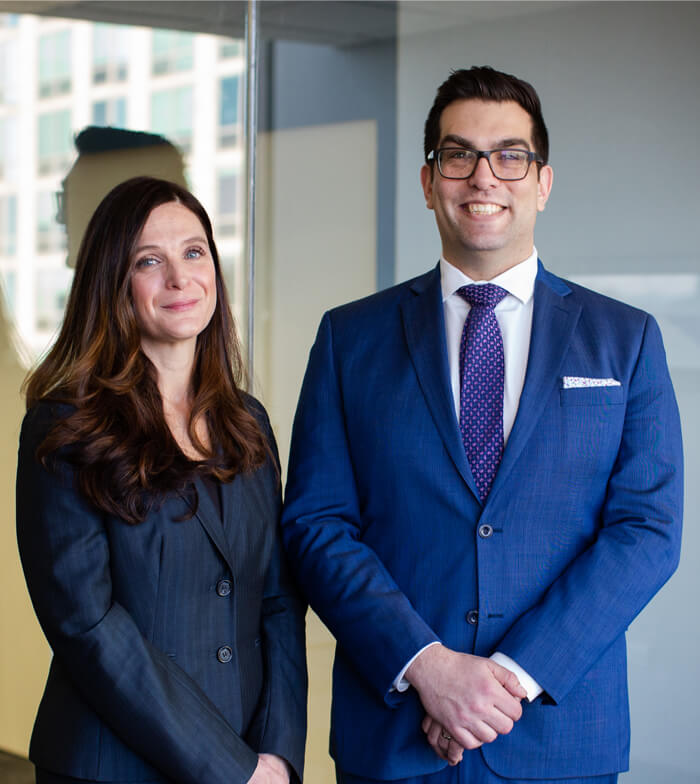Maintenance (Alimony)
In many divorce cases, the issue of alimony or spousal support will arise. More formally, this is known as maintenance and is a sum of money paid from one spouse to the other. Maintenance is designed to help the lower-earning spouse maintain the standard of living he or she would have enjoyed if the marriage had not ended.
Maintenance is typically sought when one spouse makes more than another, which happens in nearly all marriages. For divorce cases in Illinois, Stern Perkoski Mendez is experienced in the factors required to calculate alimony, as well as in resolving the issue should it be a contested area of the divorce.
The stress of divorce can be easily compounded when money is involved, which is why our office will help guide you through the process and work toward a resolution—whether it can be achieved amicably or through litigation.
What is alimony or maintenance?
In an Illinois divorce, maintenance (also know as alimony) is the division of income between the spouses to maintain a standard of living similar to if the marriage had not dissolved. It is paid out of the gross income of the two divorcing spouses and is distinct from property division. Payments are typically paid monthly unless the parties have come to another agreement. In almost all Evanston, Chicago and suburban cases, alimony is taxable to the recipient and tax-deductible to the payor.
How is maintenance or alimony calculated?
Except where the couple otherwise agrees, maintenance awards in Illinois typically follow a statutory formula. By statute, maintenance is calculated at 33 percent of the higher earning spouse’s net income minus 25 percent of the lower earning spouse’s net income. The lower earning spouse cannot receive more than 40 percent of the parties’ combined income.
What does that mean? Take a look at our Maintenance Calculator for examples and an app where you can calculate spousal support in real time.
See our Maintenance Calculator >
The bottom line is that maintenance can be complicated. But Stern Perkoski Mendez in Evanston, Chicago, Lake Forest and Oak Brook is familiar with the legal statutes and committed to helping the process be as easy as possible. When it comes to the numbers, we believe you shouldn’t be left confused.
When does maintenance begin and end?
For an Evanston, Chicago, Lake Forest and Oak Brook divorce, spousal support may begin during the case; this can be temporary maintenance or only for the interim of the case. Otherwise, it may begin at the end of the case, which is called “final maintenance.”
Maintenance will no longer be paid if one of the following occurs:
- Death of either party
- Remarriage
- Conjugal cohabitation on a continual basis (e.g. living with a significant other)
How long is maintenance paid?
In most circumstances, maintenance is paid for a period of months and years based on the length of marriage, then is reviewed or terminated after that. The longer a couple has been married, the longer the support obligation.
For marriages under 5 years, the duration of the support obligation is equal to 20% of the length of marriage. From there, the duration of support increases by 4% for each subsequent year of marriage. Accordingly, the duration of support looks like this:
- 0-5 years = support is paid for 20% of the length of marriage
- 5-6 years = support is paid for 24% of the length of marriage
- 6-7 years = support is paid for 28% of the length of marriage
- 7-8 years = support is paid for 32% of the length of marriage
- 8-9 years = support is paid for 36% of the length of marriage
- 9-10 years = support is paid for 40% of the length of marriage
- 10-11 years = support is paid for 44% of the length of marriage
- 11-12 years = support is paid for 48% of the length of marriage
- 12-13 years = support is paid for 52% of the length of marriage
- 13-14 years = support is paid for 56% of the length of marriage
- 14-15 years = support is paid for 60% of the length of marriage
- 15-16 years = support is paid for 64% of the length of marriage
- 16-17 years = support is paid for 68% of the length of marriage
- 17-18 years = support is paid for 72% of the length of marriage
- 18-19 years = support is paid for 76% of the length of marriage
- 19-20 years = support is paid for 80% of the length of marriage
- 20 years or more = support is paid for a period equal to the length of marriage or permanently
Permanent maintenance may be appropriate if one party cannot support him or herself or when the couple was married longer than 20 years.
Modification of Maintenance in Evanston, Chicago, Lake Forest and Oak Brook
Most Illinois maintenance or spousal support awards can be modified upon a substantial change in circumstance, such as:
- If the paying-spouse’s income goes down
- If either the paying-spouse or recipient-spouse experiences a dramatic increase in their cost of living—such as unexpected medical bills
- If the recipient-spouse is unable to become self-supporting or experiences other financial strains beyond control—in which case, the maintenance term may be extended
Should you need to modify your maintenance agreement, you are not required to use the same family law attorney who handled your initial divorce. Contact Stern Perkoski Mendez to discuss modifying alimony in Chicago, the North Shore, DuPage County and surrounding suburbs.
Contact Our Divorce Law Firm in Evanston, Chicago, Lake Forest and Oak Brook
If you need assistance calculating alimony, modifying your maintenance payment or have any questions, Stern Perkoski Mendez is here to help. Request a free consultation online or call us at (847) 868-9584. We can meet with you in our offices in Evanston, Chicago, Lake Forest and Oak Brook, or at another location.

